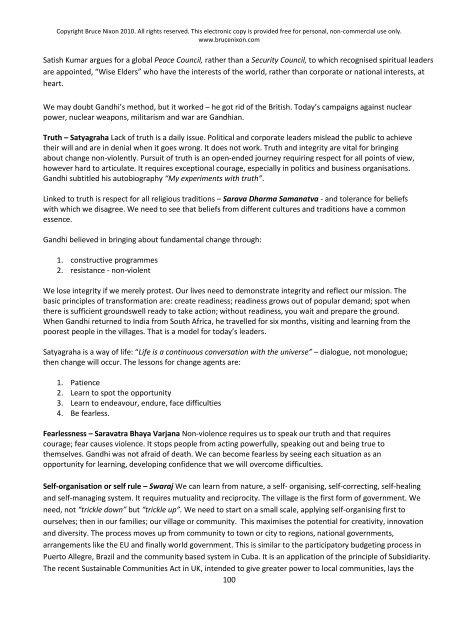A better world is possible - Global Commons Institute
A better world is possible - Global Commons Institute
A better world is possible - Global Commons Institute
Create successful ePaper yourself
Turn your PDF publications into a flip-book with our unique Google optimized e-Paper software.
Copyright Bruce Nixon 2010. All rights reserved. Th<strong>is</strong> electronic copy <strong>is</strong> provided free for personal, non-commercial use only.<br />
www.brucenixon.com<br />
Sat<strong>is</strong>h Kumar argues for a global Peace Council, rather than a Security Council, to which recogn<strong>is</strong>ed spiritual leaders<br />
are appointed, “W<strong>is</strong>e Elders” who have the interests of the <strong>world</strong>, rather than corporate or national interests, at<br />
heart.<br />
We may doubt Gandhi’s method, but it worked – he got rid of the Brit<strong>is</strong>h. Today’s campaigns against nuclear<br />
power, nuclear weapons, militar<strong>is</strong>m and war are Gandhian.<br />
Truth – Satyagraha Lack of truth <strong>is</strong> a daily <strong>is</strong>sue. Political and corporate leaders m<strong>is</strong>lead the public to achieve<br />
their will and are in denial when it goes wrong. It does not work. Truth and integrity are vital for bringing<br />
about change non-violently. Pursuit of truth <strong>is</strong> an open-ended journey requiring respect for all points of view,<br />
however hard to articulate. It requires exceptional courage, especially in politics and business organ<strong>is</strong>ations.<br />
Gandhi subtitled h<strong>is</strong> autobiography “My experiments with truth”.<br />
Linked to truth <strong>is</strong> respect for all religious traditions – Sarava Dharma Samanatva - and tolerance for beliefs<br />
with which we d<strong>is</strong>agree. We need to see that beliefs from different cultures and traditions have a common<br />
essence.<br />
Gandhi believed in bringing about fundamental change through:<br />
1. constructive programmes<br />
2. res<strong>is</strong>tance - non-violent<br />
We lose integrity if we merely protest. Our lives need to demonstrate integrity and reflect our m<strong>is</strong>sion. The<br />
basic principles of transformation are: create readiness; readiness grows out of popular demand; spot when<br />
there <strong>is</strong> sufficient groundswell ready to take action; without readiness, you wait and prepare the ground.<br />
When Gandhi returned to India from South Africa, he travelled for six months, v<strong>is</strong>iting and learning from the<br />
poorest people in the villages. That <strong>is</strong> a model for today’s leaders.<br />
Satyagraha <strong>is</strong> a way of life: “Life <strong>is</strong> a continuous conversation with the universe” – dialogue, not monologue;<br />
then change will occur. The lessons for change agents are:<br />
1. Patience<br />
2. Learn to spot the opportunity<br />
3. Learn to endeavour, endure, face difficulties<br />
4. Be fearless.<br />
Fearlessness – Saravatra Bhaya Varjana Non-violence requires us to speak our truth and that requires<br />
courage; fear causes violence. It stops people from acting powerfully, speaking out and being true to<br />
themselves. Gandhi was not afraid of death. We can become fearless by seeing each situation as an<br />
opportunity for learning, developing confidence that we will overcome difficulties.<br />
Self-organ<strong>is</strong>ation or self rule – Swaraj We can learn from nature, a self- organ<strong>is</strong>ing, self-correcting, self-healing<br />
and self-managing system. It requires mutuality and reciprocity. The village <strong>is</strong> the first form of government. We<br />
need, not “trickle down” but “trickle up”. We need to start on a small scale, applying self-organ<strong>is</strong>ing first to<br />
ourselves; then in our families; our village or community. Th<strong>is</strong> maxim<strong>is</strong>es the potential for creativity, innovation<br />
and diversity. The process moves up from community to town or city to regions, national governments,<br />
arrangements like the EU and finally <strong>world</strong> government. Th<strong>is</strong> <strong>is</strong> similar to the participatory budgeting process in<br />
Puerto Allegre, Brazil and the community based system in Cuba. It <strong>is</strong> an application of the principle of Subsidiarity.<br />
The recent Sustainable Communities Act in UK, intended to give greater power to local communities, lays the<br />
100
















